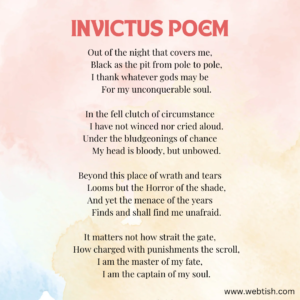Invictus,” a short but powerful poem by William Ernest Henley, stands as a testament to the indomitable human spirit. Written in 1875 and published in 1888, the poem’s Latin title, meaning “unconquered,” encapsulates its central theme of resilience in the face of adversity.
A Brief History of “Invictus”
William Ernest Henley, the poet behind “Invictus,” penned this enduring work during a challenging period in his life. At just 12 years old, Henley was diagnosed with tuberculosis of the bone, which later necessitated the amputation of his leg below the knee. Despite this, Henley’s resolve never wavered. “Invictus” reflects his inner strength and determination, offering a glimpse into the mindset of a man who refused to let his circumstances define him.
The Poem: A Deeper Dive
“Invictus” is composed of four quatrains, each carrying a powerful message of courage and resilience. Here is the full text of the poem:
Out of the night that covers me,
Black as the pit from pole to pole,I thank whatever gods may beFor my unconquerable soul.In the fell clutch of circumstanceI have not winced nor cried aloud.Under the bludgeonings of chanceMy head is bloody, but unbowed.Beyond this place of wrath and tearsLooms but the Horror of the shade,And yet the menace of the yearsFinds and shall find me unafraid.
It matters not how strait the gate,How charged with punishments the scroll,I am the master of my fate,I am the captain of my soul.

Key Themes and Analysis
- Resilience in the Face of Adversity: The poem opens with the speaker acknowledging the “night” that covers him, symbolizing a period of hardship or suffering. Despite the darkness, he remains thankful for his “unconquerable soul,” emphasizing the resilience that allows him to endure.
- Defiance Against Challenges: In the second stanza, Henley speaks of the “fell clutch of circumstance” and the “bludgeonings of chance,” which refer to life’s unpredictability and the trials that come with it. Despite being “bloody,” his head remains “unbowed,” showcasing his defiance against the hardships he faces.
- Courage in the Face of Mortality: The third stanza addresses the inevitability of death, described as the “Horror of the shade.” Even as he confronts this ultimate unknown, Henley remains “unafraid,” demonstrating a fearless acceptance of life’s end.
- Self-Mastery and Control: The final stanza delivers the poem’s most famous lines: “I am the master of my fate, / I am the captain of my soul.” Here, Henley asserts his belief in personal agency and self-mastery. No matter the external circumstances, he maintains control over his inner self.
The Legacy of “Invictus”
“Invictus” has inspired countless individuals over the years, including notable figures like Nelson Mandela, who recited the poem to fellow inmates during his imprisonment. Its message of unwavering courage and self-determination continues to resonate, offering comfort and strength to those facing their own challenges.
See Also: 100 Hard Riddles for Adults and Kids With Answers
In conclusion, “Invictus” is more than just a poem; it’s a declaration of the human spirit’s resilience. Henley’s words remind us that, even in the darkest times, we possess the inner strength to remain unconquered. Whether read as a personal mantra or shared as a source of encouragement, “Invictus” stands as a timeless tribute to the power of the human will.